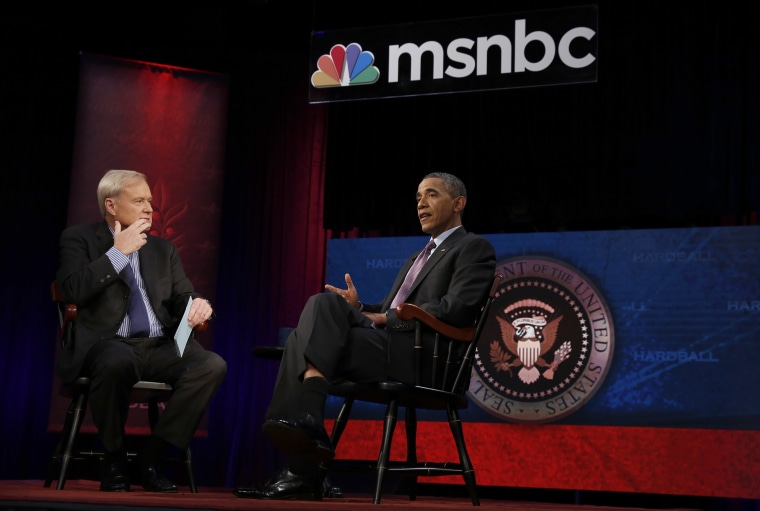In his interview with Chris Matthews at American University that aired Thursday night, President Obama was asked about Republican efforts to make it harder for minorities and other Democratic-leaning groups to vote. If I were, say, a lawyer or activist working fulltime to push back against these efforts, I might find Obama’s response a little disappointing.
I’ve put the entire response at the bottom of this post. But it began with Obama citing the bipartisan commission that he announced in February, which is set to report back to him next year with technical recommendations for how to reduce long lines, improve the voter registration process, clean up voter rolls, and so on.
Some people think the panel, whose recommendations are non-binding, won’t accomplish much. But Heather Gerken of Yale Law School has explained why those kind of technical fixes, if implemented, could actually do a lot to make the voting process easier.
Still, the reality is that several key states right now look much more likely to move in the opposite direction: Both Ohio and Wisconsin are currently considering GOP-backed measures—cuts to early voting, and an end to same-day voter registration—that appear almost custom designed to create longer lines on election day in urban areas.
Here’s what Obama went on to say: “[I]f we have evidence that you have mechanisms that are specifically designed to discriminate against certain groups of voters then the Justice Department will come down on them and file suit.”
Not to nitpick, but this is an oddly conditional way to put it. The Justice Department already has filed suit against restrictive voting laws in Texas and North Carolina, citing reams of evidence that they disproportionately hurt minorities. Does Obama not have confidence in those cases?
Here’s what Obama said next, and it was the point he seemed most eager to make:
[I]n the last election, folks still voted. And if people feel engaged enough and have a sense of a stake in our democracy, you know, you’ll be able to vote. And our biggest problem right now is not the misguided efforts of some of these state legislatures. Our biggest problem is the one that you alluded to earlier which is people’s skepticism that government can make a difference.
Now in numerical terms, Obama’s of course correct that the number of people who choose not to vote is far greater than the number prevented from voting. But the idea that if you really want to vote, you’ll be able to is just flat wrong these days, as people like Lorene Hutchins in Wisconsin and Rosanell Eaton in North Carolina have testified. Obama’s formulation plays into the hands of supporters of voting restrictions, who argue that anyone stopped from voting by voter ID laws or cutbacks to voting hours must not really care much about voting anyway.
More broadly, the raucous cheers for Obama’s election night promise to “fix” long lines at the polls came from the belief that he understood voter suppression efforts as an urgent civil rights issue requiring sustained and passionate engagement, not as a design problem amenable to a technocratic fix. And there was little in Obama’s response to Matthews that suggested he’s thinking about it that way.
Here’s Obama’s response in full:
A couple of things: You saw the lines we had not only in ‘08 but then in ‘12. Some of these folks might have stood in line. And I said on election night, that’s not acceptable in a democracy that has been around as long as ours and that the world looks to. So we actually immediately assigned my chief election lawyer and Mitt Romney’s chief election lawyer to sit down with a group of experts and come up with a whole series of voter reforms. They’re supposed to report back to me by the end of this year, so that early next year we’re going to put forward what we know will be a bipartisan effort, or a bipartisan proposal, to encourage people to vote.You can’t say you take pride in American democracy, American constitutionalism, and American exceptionalism, and then you’re doing everything you can to make it harder for people to vote as opposed to easier for people to vote. So I think there’s some commonsense things that we can do – and I won’t preview the proposals because I haven’t gotten them yet.Keep in mind though, for all the efforts that have been made—and some of them by the way may be illegal, may violate the Voting Rights Act, even after the Supreme Courts’ recent ruling and our Justice Department’s going to be staying on them – if we have evidence that you have mechanisms that are specifically designed to discriminate against certain groups of voters then the Justice Department will come down on them and file suit.The one point I want to make though is that even with all the efforts that were made, let’s say in the last election, folks still voted, and if people feel engaged enough and have a sense of a stake in our democracy, you know, you’ll be able to vote. And our biggest problem right now is not the misguided efforts of some of these state legislatures. Our biggest problem is the one that you alluded to earlier which is people’s skepticism that government can make a difference. And even in the best of years these days, we still have about 40% of the population that’s eligible to vote that chooses to opt out. And they’re not being turned away at the polls, they’re turning themselves away, and that’s something that we’ve got to get at.
